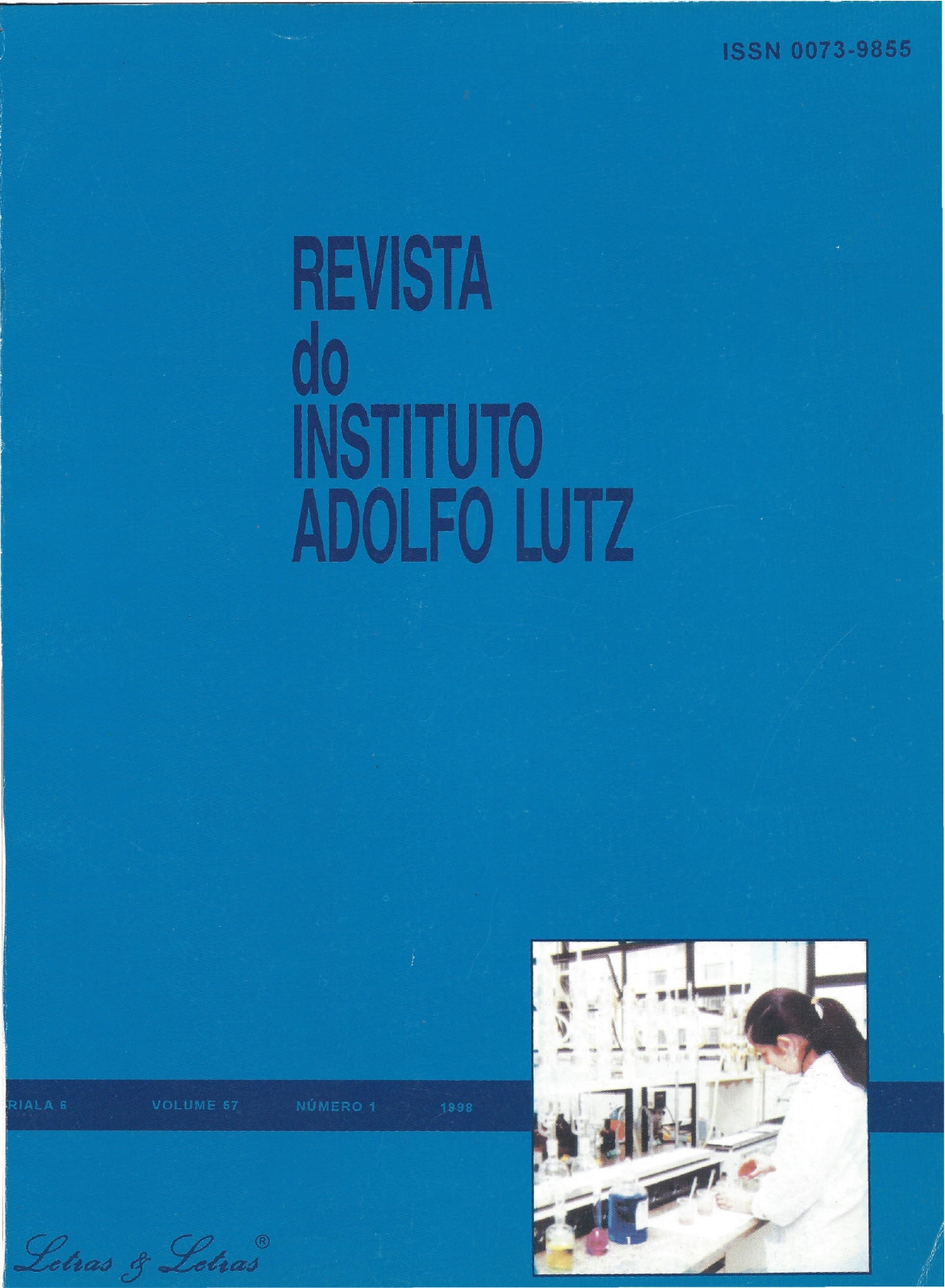Resumo
Foi determinada pela primeira vez a composição de carotenóides de nectarina (Prunus
persiea). Onze carotenóides foram identificados: 13-cis-caroteno, fral1s-caroteno, 9-cis-caroteno, trans-ç-caroteno, neo- criptoxantina, irans-criptoxantina, trans-luteína, trans-zeaxantina, trans-violaxantina, trans-mutatoxantina e trans-auroxantina. O principal carotcnóide foi a trans-B criproxantina (3,9 ± 0,7 ug/g), perfazendo 40,6% do total de carotcnóides (9,6 ± 0,7 ug/g), seguida pela trans-zeaxantina (1,6 ± 0,3 ug/g), trans-luteína (l,l ± 0,2 u/g) e trans-caroteno (1,0 ± 0,2 ug/g). O valor de vitamina A, proveniente de isômeros eis e trans da b-criptoxantina e do -caroteno foi de 54 ±
5 ERllOO g. A composição de carotenóides de nectarina mostrou-se muito semelhante a do pêssego, fato esperado já que estas frutas pertencem à mesma família.
Referências
2. BENDICH, A. - Carotenoids and the immune response. 1. Nutr., 119: 112-115, 1990.
3. BENDICH, A. - Recent advances in clinical research involving carotenoids. Pure Appl. Chem., 66: 10171024,1994.
4.BENDICH, A. & OLSON, J.A. - Biological actions of carotenoids. FASEB1. 3: 1927-1932,1989.
5. BUREAU, J.L. & BUSHWAY, R.J. - HPLC determination of carotenoids in fruits and vegetables in the United States. J. Food Sci., 51: 128-130, 1986.
6. BYERS, T. & PERRY, G. - Dietary carotenes, vitamin C, and vitamin E as protective antioxidants in human cancers. Am. Rev. Nutr., 12: 139-159, 1992.
7. CAVALCANTE, M.L. & RODRIGUEZ-AMAYA, D.B. - Carotenoid composition ofthe tropical fruits Eugenia uniflora and Malpighia glabra. In: CHARALAMBUS, G. (ed), Food Science and Human Nutrition, p. 643-50, Amsterdam, Elsevier Science Publishers B.V., 1992.
8. CECCHI, H.M. & RODRIGUEZ-AMAYA, D.B. Carotenoid composition and vitamin A value offresh and pasteurized cashew-apple (Anaeardium oeeidentale L.)juice. J. Food Sei., 46: 147-149,1981.
9. CURL, A.L. - The carotenoids of cling peaches. Food Res., 24: 413-421, 1959.
10. CURL, A.L. - The carotenoids of apricots. Food Res., 25: 190-196, 1960.
11. DAVIES, B.H. Carotenoids. In GOODWIN, T.W.(ed),. Chemistry and Biochemistry ofPlant Pigments, 2nd ed., vol. 2, p. 38-165, London, Academic Press, 1976.
12. GEBHARDT, S.E.; ELKINS, E.R.; HUMPHREY, J. - Comparison of two methods for determining the vitamin A value of clingstone peaches. 1.Agric. Food Chem., 25: 629-632, 1977.
13. GERSTER, H. - Potential role of beta-carotene in the prevention of cardiovascular disease. 1nter. 1. Vit. Nutr. Res., 61: 277-291, 1991.
14. GODOY, H.T. & RODRIGUEZ-AMAYA, D.B. Carotenoid composition of commercial mangoes from Brazil. Lebensm. Wiss. Teehnol., 22: 104-106, 1989.
15. GODOY, H.T. & RODRIGUEZ-AMAYA, D.B. Occurrence of cis-isomers of provitamin A in Brazilian fruits. J Agric. Faod Chem., 42: 1306-1313,1994.
16. GODOY, H.T. & RODRIGUEZ-AMAYA, D.B. Detennination ofthe carotenoids and vitaminA value of Brazilían loquats (Eriobotrya japonica Lind1.).
Areh. Latinoamer. Nutr., 45: 113-124, 1995.
17. GROSS, J. - Carotenoid changes in the mesocarp of the Readhaven peach (Prunus Persiea) during ripening. Z. Pfanzenphysiol, 94: 461-465, 1979.
18. KHACHIK, F.; BEECHER, G.R.; LUSBY, W.R. Separation, identification and quantification of the major carotenoids in extracts of apricots, peaches, eantaloupe and pink grapefruit by liquid ehromatography. J. Agrie. Food Chem., 37: 14651473, 1989.
19. KIMURA, M.; RODRIGUEZ-AMAYA, D.B.; YOKOYAMA, S.M. - Cultivar differences and gcographic effects 011 the carotcnoid composition and
vitamin A valuc of papaya. Lebensm . Wiss. Teehnol., 24: 415-418,1991.
20. KR1NSKY, N.I. - Carotenoids in mcdicine. In: KRINSKY, N.I., MATHEWS-ROTH, M.M. & TAYLOR, R.F. (eds.), Carotenoids: Chemistry and Biology, p. 279-291, NewYork, PlenumPress, 1990.
21. KRINSKY, N.I. - The biological properties of earotenoids. PureAppl. Chem, 66: 1003-1010,1994.
22. MATHEWS-ROTH, M.M. - Carotcnoids and cancer prevention experimental and cpidemiological studies. Fure Appl. Chem., 57: 717-722,1985.
23. MATHEWS-ROTH, M.M. - Recent progress in the medical application of carotcnoids. Pure Appl. Chem., 63: 147-156, 1991.
24. NAS-NRC - Recommended Dietary Allowanees, 10th ed, p. 78-92, Washington, National Acadcmy of Scienee/National Research Couneil, 1989.
25. OLSON, J.A. - Biological actions of carotenoids. JNutr., 19: 94-95, 1989.
26. PHILIP, T. & CHEN, T. S. - Development of a method for the quantitative estimation of provitamin A earotenoids in some fruits. J. Food Sei., 53: 17031706, 1988.
27. QUACKENBUSH, F.W. - Reverse phase HPLC separation of eis and trans carotenoids and its application to beta-carotene in food materiais. J. Liq.
Chromatogr . 10: 643-653, 1987.
28. RODRlGUEZ, D.B.; RAYMUNDO, L.C.; LEE, r.c., SIMPSON, K.L.; CHICHESTER, e.0. - Carotenoid pigment ehanges in ripening Momordica charantia fruits. Ann. Bot. 40: 615-622, 1976.
29. RODRIGUEZ-AMAYA, D.B.; KIMURA, M. - Composição de carotenóides e valor de vitamina A em cajá (Spondias lutea). Ciênc. Teenol. Aliment. 9: 148162, 1989.
30. RODRIGUEZ-AMAYA, D.B.; BOBBIO, P.A.; BOBBIO, F.O. - Carotcnoid composition and vitamin A value ofthe Brazilian fruit Cyphomandra betaeea. Food Chem., 12: 61-65,1983.
31. WILBERG, v.e.& RODRIGUEZ-AMAYA, D.B. HPLC quantitation ofmajor carotenoids offresh and processcd guava, mango and papaya. Lebesm. Wiss. Teehnol., 28: 474-480, 1995.
32. ZECHMEISTER, L. - Cis-trans Isomerie Carotenoids Vitamins A and Aryl Polyenes, Vienna, SpringerVcrlag, 1962.
33. ZIEGLER, R.G. - Vegetablcs, fruits, and carotenoids and thc risk of cancer. Am. J. Clin. Nutr., 53: 251-259, 1991.

Este trabalho está licenciado sob uma licença Creative Commons Attribution 4.0 International License.
Copyright (c) 1998 HELENA Teixeira Godoy, DÉLIA B. Rodriguez-Amaya
